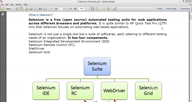AS/400 (IBM iSeries, AS/400e, eServer iSeries/400)

Course offered by Rajesh Palepu

Gallery (1)


4.7 Avg Rating
10 Reviews
15 Students
8 Courses
Students also enrolled in these courses

Course offered by Sharif
Tutor has not setup batch timings yet. Book a Demo to talk to the Tutor.
Different batches available for this Course
Reply to 's review
Enter your reply*
Your reply has been successfully submitted.
Certified
The Certified badge indicates that the Tutor has received good amount of positive feedback from Students.
![]() You have successfully registered
You have successfully registered
AS/400 (IBM iSeries, AS/400e, eServer iSeries/400) by Rajesh Palepu

Select One
Tell us a little more about yourself
AS/400 (IBM iSeries, AS/400e, eServer iSeries/400) by Rajesh Palepu

00
Days
01
Hour
01
Min
01
Sec
Verify Your Mobile Number
Please verify your Mobile Number to book this free class.
 Update
Update Please enter 10 digit phone number.
Please enter your phone number.
Please Enter a valid Mobile Number
This number is already in use.
Please enter OTP.
080-66-0844-42